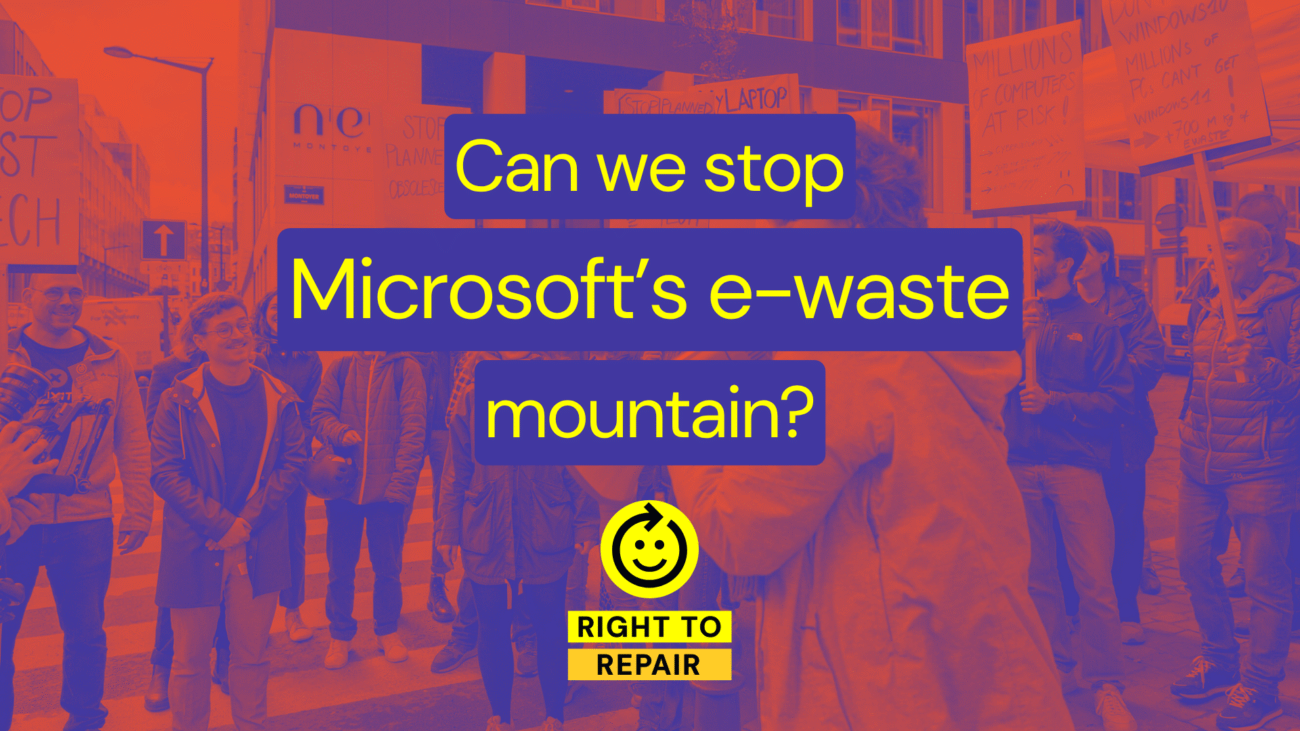A partir del 14 d’octubre, el Dia Internacional dels Residus Electrònics, Microsoft deixarà d’oferir actualitzacions automàtiques de Windows 10. Els activistes exigeixen que la UE prengui mesures contra l’obsolescència programada mentre se celebren milers d’esdeveniments de reparació a tot el món per commemorar el Dia Internacional de la Reparació, el 18 d’octubre.
Data de publicació: Brussel·les, 14 d’octubre de 2025.
Imatges disponibles: Imatges dels dispositius afectats i de la protesta a Brussel·les contra la decisió de Microsoft de posar fi al suport tècnic de Windows 10 aquí.
Els activistes diuen ‘no’ a Microsoft i no a l’obsolescència del software
Activistes van organitzar una protesta davant de les oficines de Microsoft a Brussel·les, exposant ordinadors perfectament funcionals que van quedar obsolets per la decisió de l’empresa de posar fi a les actualitzacions gratuïtes i automàtiques de Windows 10.
Aquesta decisió farà que prop de 400 milions d’ordinadors d’arreu del món deixin de ser segurs de la nit al dia, cosa que podria generar més de 700 milions de kg de residus elèctrics, que se sumaran als 62 000 milions de kg de residus electrònics que es produeixen cada any mundialment. Irònicament, la decisió entrarà en vigor el 14 d’octubre: el Dia Internacional dels Residus Electrònics.
La fi del suport tècnic de Windows 10 és només un exemple d’un problema sistèmic: l’obsolescència programada pel software. Sense regulació, les empreses poden suspendre les actualitzacions dels dispositius (des d’ordinadors portàtils fins a equips mèdics, electrodomèstics intel·ligents i dispositius de fitness), cosa que obliga els consumidors a substituir productes que encara funcionen.
Dolent per als negocis, dolent per als consumidors i dolent per al medi ambient
A part de ser un problema mediambiental, les empreses s’enfronten a costos d’actualització innecessaris, mentre que els consumidors, especialment els de llars amb ingressos baixos, s’exposen a amenaces de ciberseguretat per utilitzar software sense suport tècnic.
Recentment, Microsoft ha concedit els consumidors de l’Espai Econòmics Europeu (EEE) una pròrroga d’un any per a les actualitzacions gratuïtes, una solució temporal que els activistes denominen «botó no molesteu». Exigeixen actualitzacions gratuïtes i automàtiques fins a almenys 2030 i una legislació sòlida de la UE per posar fi a l’obsolescència programada a Europa.
En una carta oberta a les comissàries europees Jessika Roswall i Henna Virkkunen, s’insta a la UE a introduir requisits d’ecodisseny que obliguen a realitzar actualitzacions de software durant 15 anys pels ordinadors portàtils i a proporcionar un suport adient per a altres productes relacionats amb l’energia.
Mathieu Rama, director de programes d’ECOS, va dir: «No hem d’abaixar la guàrdia perquè Microsoft ajorni l’alarma i ofereixi un any addicional d’actualitzacions de Windows 10. La Comissió Europea ha d’aprofitar aquest temps per introduir una solució real: normes més estrictes sobre l’obsolescència del software per deixar de malgastar els valuosos recursos dels nostres productes digitals. Necessitem com a mínim quinze anys d’actualitzacions de seguretat per a tots els productes digitals».
Cristina Ganapini, coordinadora de Right to Repair Europe, va afirmar: «La decisió de Microsoft de deixar d’oferir suport per a Windows 10 podria convertir milions d’ordinadors funcionals en residus electrònics, no perquè estiguin defectuosos, sinó perquè així ho diu el software. Això és la «tecnologia ràpida» en acció: un sistema que es beneficia de l’obsolescència forçada i les reparacions bloquejades, buidant butxaques i emmetzinant el planeta. Les normes actuals de la UE no aconsegueixen parar-la. Necessitem reparabilitat obligatòria, suport de software a llarg termini i lleis sòlides sobre el dret a reparar. El reciclatge no és suficient; la Llei d’Economia Circular ha de prioritzar la reutilització i la reparació, abans que la tecnologia ràpida ens costi la Terra».
L’acció de Brussel·les forma part d’una crida més àmplia a l’acció durant el Dia Internacional de la Reparació. Milers d’esdeveniments arreu del món promouen la reparació i la reutilització com a solucions als residus electrònics.
Contacte: Cristina Ganapini, coordinadora, Right to Repair Europe, info@repair.eu
Nota per als editors/es:
- Imatges disponibles: Imatges de l’acció a Brussel·les i dels dispositius afectats aquí
- Dia Internacional de la Reparació: Mapa global d’esdeveniments relacionats amb la reparació aquí
- Carta oberta al comissari Roswall i a Virkkunen: Enllaç
- Carta internacional a Microsoft: Enllaç
Fi

